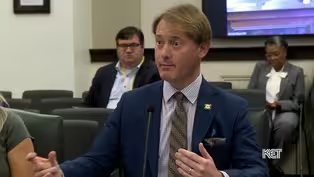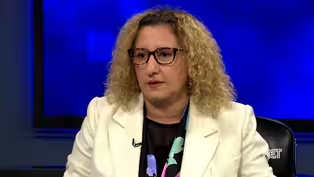
Why Stronger Hurricanes Are New Normal
Clip: Season 3 Episode 93 | 3m 26sVideo has Closed Captions
Forecasters explain why stronger hurricanes are becoming the new normal.
Florida is bracing for its second catastrophic hurricane in less than two weeks. Christie Dutton spoke to forecasters with the Climate Prediction Center about this historic hurricane season and why stronger hurricanes are becoming the new normal.
Problems playing video? | Closed Captioning Feedback
Problems playing video? | Closed Captioning Feedback
Kentucky Edition is a local public television program presented by KET

Why Stronger Hurricanes Are New Normal
Clip: Season 3 Episode 93 | 3m 26sVideo has Closed Captions
Florida is bracing for its second catastrophic hurricane in less than two weeks. Christie Dutton spoke to forecasters with the Climate Prediction Center about this historic hurricane season and why stronger hurricanes are becoming the new normal.
Problems playing video? | Closed Captioning Feedback
How to Watch Kentucky Edition
Kentucky Edition is available to stream on pbs.org and the free PBS App, available on iPhone, Apple TV, Android TV, Android smartphones, Amazon Fire TV, Amazon Fire Tablet, Roku, Samsung Smart TV, and Vizio.
Providing Support for PBS.org
Learn Moreabout PBS online sponsorshipTurning now to weather developments.
Florida is bracing for its second catastrophic hurricane and less than two weeks.
Hurricane Milton is predicted to hit near Tampa Bay late Wednesday night with expectations of destructive winds, flooding and a record storm surge.
Our Christy Dotson spoke to the forecasters with the Climate Prediction Center about this historic hurricane season and why stronger hurricanes are becoming the new normal.
Matt Rosenkranz, you've been forecasting hurricane season for years and years now.
So tell us as we watch Hurricane Milton barreled toward the Florida Gulf Coast with Hurricane Helene still fresh in our memory, how unusual is it to have two hurricanes so intense back to back?
So the two the two hurricanes that intense males reaching Category five alone, reaching Category four, that's pretty uncommon.
And within ten days of each other, it's not uncommon to have a couple of those in the Gulf.
During these busy seasons, though, 2006 that was a busy season, had a lot of impact in the west coast of Florida.
So it's not unprecedented, but it's been some pretty rare conditions that have made this year happen last couple of weeks.
Yeah, And this hurricane season has been abnormal, to say the least.
Right.
Because when we thought it would be really busy like this, it really wasn't what was going on.
Yeah, it kind of started off busy.
And so like a good roller coaster.
Start off busy.
We had a little lull in their early parts commercial, so busy it kind of wasn't.
And then September kind of came back and reminded us, Nope, we are still in the hurricane season until November 30th.
Yeah, because we started out with Hurricane Beryl and that reached category five.
Or the earliest category five on record.
So was like, all right, let's you know, we looked at a busy season and we're like, it's going to happen.
And then we kind of hit the lull.
The West African monsoon, that's the seed for a lot of these kind of went so far to the north.
It wasn't seeding the hurricanes the right way that we see have seen for the past, you know, 60, 70 years.
And then the sea surface temperature temperatures just kind of keep getting warmer and warmer.
So now that we've got some of these seeds from the African monsoon and also from Central America and clusters of thunderstorms there, they just have a lot of energy to work with.
So they can just they're just moving to a really ripe environment.
Mm hmm.
So the warm sea surface temperatures, is that one major factor for Hurricane Milton and Hurricane Helene, both being able to power up so quickly.
Absolutely.
They warm sea surface temperatures and that warmth at depth because they've been so warm this entire year.
They're warm.
They're above normally warm all the way down to a thousand feet below the ocean surface.
So they've got these storms just have a reservoir of energy to pull from and they can just keep pulling it and bringing it up into the atmosphere and intensifying.
So is that something that's going to keep happening with those warm ocean temperatures?
So is just going to be the new normal, this kind of and more intense, more frequent hurricanes?
A lot of the modeling does point to that More of the tropical storms are going to reach hurricane strength and more of the hurricanes are going to reach that category four and five strength.
Thank you.
Christy, Unlike Helene, Kentucky's weather will not be affected by Hurricane Milton.
Video has Closed Captions
Clip: S3 Ep93 | 3m 4s | Students hold a vigil to call for an end to the violence in the Middle East. (3m 4s)
Video has Closed Captions
Clip: S3 Ep93 | 2m 57s | EKU is partnering with Allegiant Air to show their students the sky is the limit. (2m 57s)
Fatal Medical Helicopter Crash
Video has Closed Captions
Clip: S3 Ep93 | 44s | A medical helicopter crash in Northern Kentucky kills three people. (44s)
Guarding Elections Against A.I.
Video has Closed Captions
Clip: S3 Ep93 | 2m 22s | Kentucky's top elections official wants protections against political deepfakes. (2m 22s)
Video has Closed Captions
Clip: S3 Ep93 | 5m 11s | Maintaining good financial habits can impact how much you spend on big ticket items. (5m 11s)
Video has Closed Captions
Clip: S3 Ep93 | 2m 50s | The University of Kentucky has its own genius. (2m 50s)
Providing Support for PBS.org
Learn Moreabout PBS online sponsorship
- News and Public Affairs

Top journalists deliver compelling original analysis of the hour's headlines.

- News and Public Affairs

FRONTLINE is investigative journalism that questions, explains and changes our world.












Support for PBS provided by:
Kentucky Edition is a local public television program presented by KET





